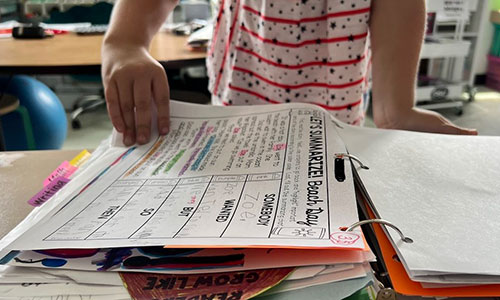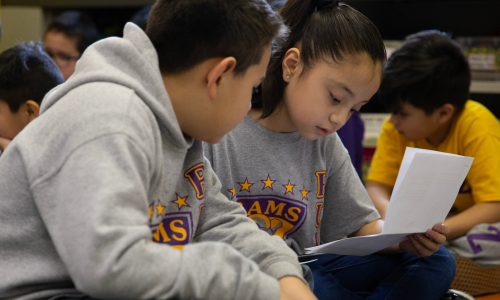
How do we know if instructional coaching is effective?
This is a question that regularly comes up for educators when discussing the role and practice of instructional coaches. Ongoing research shows that instructional coaching is effective for improving teacher practices and student learning, but this is not usually the context in which the question is asked. Usually, when district leaders, school administration, teachers, and instructional coaches ask themselves this question, what they really want to know is if their instructional coaching is effective.
How to measure the effectiveness of instructional coaching is a quandary for many schools and districts. There are many logistical concerns, including how much time it can take to collect evidence of impact, who is responsible for providing the evidence, who is responsible for collecting the evidence, and which evidence should be valued. And, while there are many options available, decisions around these concerns should be considered at a program level, where factors such as capacity, school goals, and technology can influence these decisions. These are not always easy decisions to make.
However, what can be simple is the type of information we seek. I offer three simple questions to help you evaluate the effectiveness of instructional coaching in your school or district. I also provide ideas for how you can collect evidence of effectiveness related to each question. Thinking through these three questions and supporting evidence can bring clarity to the decisions we all make about measuring instructional coaching’s effectiveness.
Let’s dive in!
Question #1: How do the coach’s role and work look?
The quality of instructional coaching matters. Part of this includes how educators perceive the work of instructional coaching. How do their relationships with the coach look and feel? Are coaches spending most of their time in collaboration with teachers via instructional coaching cycles? Here are some ways to learn more.
Instructional coaching feedback surveys
A few different questions can reveal how teachers perceive the coach’s work and their role. These surveys should only be sent to teachers who have worked with the coach, not all teachers. (Teachers with no experience with a coach can skew the results significantly.) Here are some questions that help show how teachers perceive a coach’s work.
- What types of activities have you engaged in with the coach?
- Do you perceive the coach as a collaborator? Why or why not?
- How well does the coach help you reflect on your work?
- How much agency do you have in the coaching process?
Time audit
A time audit is a useful self-reflection of how coaches are spending their time.
- How well do your activities align with your role and goals as a coach?
- How much time are you using for coaching teachers, and how much time are you spending on other duties?
Coaching logs
A descriptive account of a coach’s actions can be used to determine how closely their work aligns with their purpose. However, coaching logs can become quite cumbersome for coaches to keep, so finding a way to streamline them through efficient formats (such as digital forms with drop-down options for various categories of work) can help immensely.
Question #2: What evidence shows that teachers are meeting their professional goals?
One of the most defining elements of the instructional coaching partnership is that it is goal-oriented.
Coaches and teachers work collaboratively to set goals and implement plans toward meeting them. Unlike shorter professional learning activities, instructional coaching is a long-term process that functions as scaffolding toward the realization of professional learning goals. So, how do we know whether teachers are meeting these goals?
Instructional coaching feedback surveys (again)
Surveying teachers can also help measure their progress toward meeting goals. Questions can relate to what degree teachers feel that instructional coaching is improving their knowledge, skills, and processes. Sample questions might include:
- Has working with your coach helped you reach professional goals? Why or why not?
- To what degree have your instructional practices improved after working with your coach?
- How well have you sustained new instructional practices you learned with your coach?
- How much improvement have you seen in your students’ learning after working with your coach?
Artifacts
If a teacher’s professional goal is focused on instructional practices, teacher actions, or specific skills, teacher-made artifacts can be useful sources of evidence. Success criteria for these artifacts can be established at the beginning of the coaching cycle to assess when they have met their goals. Examples could be unit plans, lesson plans, or teacher-created materials for students, such as written directions, learning modules, or student-facing handouts.
Goal tracking
Coaches can keep track of coaching cycles and record when teachers’ professional goals have been met. Here are a few questions to consider when developing a chart or digital form to keep track of successes:
- What goal(s) did the teacher have?
- Were the goals met?
- What criteria were used to assess progress on meeting goals?
- What learner evidence was used to determine success?
- What progress was made toward the goal (even if it was not met)?
Question #3: What evidence shows that students are meeting their learning goals?
The most important measures of success are those that show the impact on students’ learning. Of course, since most coaches often do not work directly with students, this can seem like the most difficult type of evidence to collect. Here are a few possibilities:
Pre- and post-assessments
Having students complete a pre-assessment before units or lessons related to specific learning targets can provide a good sense of their current level of knowledge or skill. A post-assessment can demonstrate the changes in learning. This is a straightforward approach that can indicate some impact from teacher and coach actions.
Student growth information
Examining student progress on interim assessments like MAP® Growth™, MAP® Reading Fluency™, and others can reveal how students are growing over time. Using prior data to influence instructional coaching goals and plans can provide some evidence of how well those goals and plans worked.
Classroom observation
If the focus of instructional coaching is related to student engagement or student actions, observation can be a wonderful way to measure impact. Examples for collecting evidence of learning through observation might include scoring or describing student performance tasks, such as using proper form in weight training, reading music, or student discussion skills, such as turn-taking or using academic language.
Student surveys
Students can provide their own impressions of learning through surveys. These surveys are tools to measure more subjective elements of student learning, such as their understanding of their developing social and emotional skills, their confidence as learners, or how they reflect on their own progress toward goals.
Student work
Evaluating work samples with criteria for success can be helpful for certain types of student products. These include student writing or digital products like websites, presentation slides, or animations.
Evaluating work samples can also be helpful for physical products such as models, artistic work, or inventions. Teachers can share a few representative samples of students’ work, rather than evaluating every student’s work as a time-efficient way to help assess the impact of instructional coaching partnerships.
Next steps
As you continue to think about the effectiveness of instructional coaching in your school or district, I encourage you to consider how your coaching program collects evidence of success. Here are some closing questions to guide you:
- Are any of the three questions in this article not being asked to help us measure effectiveness?
- What ideas do instructional coaches have for the types of evidence that would help them measure their impact?
- How could evidence be triangulated to impact instructional coaching programs and professional learning decisions?
- How could evidence be summarized and shared with stakeholders?
To learn more about how NWEA can support you in instructional coaching work, head to our website.







